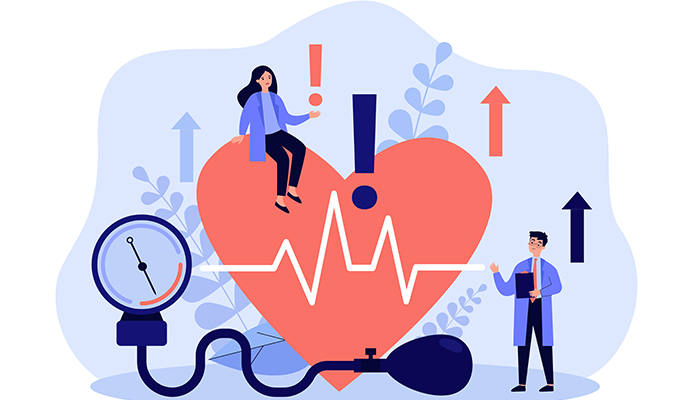What to expect from your first Cardiologist near me appointment
What to expect from your first Cardiologist near me appointment
Blog Article
Comprehending the Significance of Cardiology in Modern Health Care Solutions
Cardiology plays an important duty in modern-day healthcare, particularly as heart disease continues to be the leading source of death worldwide. Advances in diagnostics and therapy have actually changed person treatment, making it possible for earlier treatments and enhanced results. The shift towards preventive cardiology empowers people to manage their health proactively. As modern technology remains to progress, the combination of ingenious solutions might additionally redefine cardiology's effect on public health, motivating a more detailed exam of emerging trends and their effects.
The Occurrence of Heart Problem and Its Impact on Public Wellness
Although heart problem stays the leading reason of fatality worldwide, its influence prolongs far past individual patients to influence public health systems and economies. The high prevalence of heart problem places a substantial pressure on health care sources, requiring boosted funding for rehab, prevention, and treatment programs. Public health efforts must attend to threat elements such as excessive weight, cigarette smoking, and less active lifestyles, which contribute substantially to the rising incidence of heart conditions.Moreover, the financial worry associated with cardiovascular disease is tremendous, encompassing not just straight medical costs however additionally indirect expenditures associated with lost productivity and premature mortality. Neighborhoods encounter challenges in handling these prices, commonly leading to differences in healthcare gain access to and results. As the populace ages and lifestyle-related dangers remain to escalate, the seriousness for efficient cardiology interventions ends up being vital. Subsequently, resolving heart problem is not just an issue of private health and wellness however likewise a critical public health priority.
Advancements in Cardiac Diagnostics and Imaging Techniques
Current developments in cardiac diagnostics and imaging techniques have actually changed the area of cardiology, improving the ability to keep an eye on and discover heart problem. Strategies such as heart MRI, CT angiography, and echocardiography have come to be progressively sophisticated, providing thorough pictures of heart frameworks and functions. These methods enable the early recognition of conditions like coronary artery condition, cardiac arrest, and valvular disorders.Moreover, improvements in non-invasive diagnostics, such as wearable innovation and remote monitoring tools, have encouraged clients and doctor. These devices help with real-time monitoring of heart rhythms and other essential indications, causing timely treatments. Additionally, expert system is being incorporated into imaging evaluation, boosting precision and effectiveness in medical diagnosis.
Developments in Therapy Options for Heart Issues
Current developments in cardiology have actually resulted in considerable innovations in treatment alternatives for heart disease. These consist of advanced surgical methods that enhance procedural end results and emerging medicines that supply new opportunities for treatment. As the field progresses, these innovations play a crucial duty in improving individual treatment and end results.
Advanced Surgical Techniques
Developments in surgical strategies have transformed the landscape of cardiology, using brand-new wish for clients with heart problems. Minimally intrusive treatments, such as catheter-based treatments, have considerably lowered recovery times and hospital remains. Methods like robotic-assisted surgical procedure boost accuracy, permitting surgeons to navigate intricate physiological structures with higher accuracy. Developments in imaging modern technology promote real-time visualization during procedures, boosting outcomes. Transcatheter aortic valve replacement (TAVR) exemplifies a development in dealing with aortic stenosis, enabling valve substitute without open-heart surgery. Additionally, hybrid techniques that integrate surgical and catheter-based approaches give customized options for different cardiac concerns. These sophisticated surgical methods not only boost individual security but likewise expand treatment choices, underscoring the crucial duty of advancement in contemporary cardiology methods.
Emerging Therapies and drugs
As the landscape of cardiology continues to evolve, emerging therapies and drugs play an essential role in boosting treatment alternatives for heart disease. Developments such as unique anticoagulants and advanced lipid-lowering representatives have changed the administration of heart diseases, greatly minimizing patient morbidity and death. Additionally, the advancement of genetics therapies and regenerative medication provides encouraging avenues for dealing with problems previously considered irreparable. Medical trials are consistently exposing the efficiency of these therapies, pushing the borders of traditional treatments. Moreover, the assimilation of electronic health modern technologies facilitates individualized medication, allowing for customized treatment plans based upon hereditary and lifestyle elements. Collectively, these developments highlight the vibrant nature of cardiology, enhancing person end results and redefining criteria of treatment in contemporary medical care.
The Duty of Preventive Cardiology in Patient Treatment
Preventive cardiology plays a vital function in individual care by concentrating on the recognition of danger aspects that add to cardiovascular disease. Via way of living adjustment approaches and very early discovery methods, medical care companies can efficiently lower the incidence of cardio occasions - Cardiologist near me. This positive strategy not just enhances client results but also advertises long-lasting health and wellness
Danger Variable Recognition
While cardio diseases remain a leading reason of morbidity and mortality worldwide, effective risk element identification works as a keystone of precautionary cardiology. Identifying threat aspects such as hypertension, hyperlipidemia, diabetic issues, and family history is necessary for early intervention. Medical care experts make use of different evaluating techniques to evaluate these variables, permitting customized safety nets. Additionally, comprehending a patient's way of life options, such as smoking cigarettes and physical inactivity, further educates danger analyses. This detailed analysis makes it possible for medical professionals to develop customized care strategies targeted at mitigating risks. By prioritizing danger element recognition, healthcare systems can improve individual outcomes and decrease the general burden of cardiovascular illness, inevitably adding to enhanced public health and wellness strategies and resource allocation.
Way Of Life Alteration Approaches
A wide variety of researches highlights the critical role of way of life alteration techniques find out in minimizing heart disease threat. These strategies encompass dietary modifications, increased exercise, smoking cigarettes cessation, and weight monitoring. By adopting a heart-healthy diet rich in fruits, vegetables, whole grains, and lean proteins, people can lower cholesterol levels and high blood pressure. Normal exercise enhances the heart and enhances overall cardio health and wellness. Furthermore, quitting cigarette smoking considerably decreases the threat of heart problem and improves healing rates for those with status quo. Weight management further contributes to cardio health and wellness by minimizing other risk elements such as diabetes mellitus and hypertension. Implementing these lifestyle changes not just advertises private well-being yet additionally acts as a foundation of preventative cardiology in person treatment.
Early Discovery Methods
Lifestyle alterations significantly add to reducing cardio illness risks, yet they are most efficient when matched with very early detection strategies. Preventive cardiology emphasizes the value of identifying prospective heart issues prior to they intensify right into significant conditions. Techniques such as high blood pressure monitoring, cholesterol testing, and advanced imaging modern technologies like echocardiograms play critical functions in evaluating cardio health. Biomarkers and genetic screening likewise boost the precision of very early discovery, permitting customized preventive methods. Normal cardiac danger evaluations equip doctor to intervene proactively, possibly preventing heart strikes and strokes (Cardiology care). By incorporating these early discovery approaches right into regular treatment, clients can gain from prompt way of life interventions and targeted treatments, eventually enhancing results and boosting high quality of life
Integrating Technology Into Cardiology Practices
As developments in modern technology remain to improve different fields, the integration of ingenious devices and systems into cardiology methods visit this site has actually come to be essential for improving patient care and outcomes. Telemedicine platforms permit cardiologists to keep track of individuals remotely, enhancing accessibility to care while lowering the worry on healthcare centers. Wearable tools, such as smartwatches, enable continual heart price tracking, informing both individuals and doctors to prospective issues in real-time. Additionally, synthetic intelligence (AI) is being utilized to analyze vast quantities of heart information, helping in early medical diagnosis and customized treatment plans. Advanced imaging techniques, including 3D echocardiography, boost visualization of heart frameworks, causing a lot more accurate interventions. Digital health and wellness documents (EHRs) streamline individual details try this web-site monitoring, making sure that cardiologists have immediate accessibility to important information. With each other, these technological developments are transforming cardiology, advertising aggressive management and boosted health and wellness outcomes for people with cardiovascular problems.
The Significance of Person Education and Involvement
Individual education and interaction play a pivotal function in the monitoring of cardiovascular health and wellness. By equipping clients with expertise about their conditions, therapy options, and way of life changes, healthcare service providers equip people to take an active role in their care. This aggressive method can cause boosted adherence to prescribed medicines, dietary adjustments, and exercise programs, inevitably reducing the danger of complications.Engagement likewise cultivates a solid patient-provider relationship, motivating open interaction and depend on. When people feel notified and entailed, they are most likely to voice concerns and ask questions, which can result in much better scientific results. In addition, instructional sources, such as workshops or electronic systems, can improve understanding and advertise self-management methods. Generally, focusing on client education and learning and engagement is vital for improving cardiovascular health and wellness, improving lifestyle, and decreasing healthcare costs related to heart diseases.
Future Trends in Cardiology and Their Potential Impact

Often Asked Questions
What Lifestyle Changes Can Lower Cardiovascular Disease Danger?
The current question addresses lifestyle adjustments that can considerably minimize cardiovascular disease threat. Cardiology. Embracing a balanced diet regimen, taking part in regular exercise, keeping a healthy weight, taking care of stress and anxiety, and preventing tobacco can especially enhance cardio wellness
Just How Can I Identify Early Indicators of Heart Troubles?
Identifying early indicators of heart issues entails tracking signs and symptoms such as chest discomfort, shortness of breath, exhaustion, and irregular heart beat. Prompt understanding of these indications can prompt essential medical evaluation and treatment for better end results.
What Are the Differences In Between Cardiologists and Heart Surgeons?
The differences in between cardiologists and cardiac surgeons depend on their duties; cardiologists primarily detect and handle heart disease through non-invasive approaches, while cardiac doctors do operations to deal with structural heart problems. Each plays an important, distinctive function.

How Commonly Should I Get My Heart Health And Wellness Checked?
The regularity of heart checkup differs based on individual threat variables. Typically, grownups must undertake assessments every one to 2 years, while those with current conditions might require even more regular assessments as suggested by health care professionals.
What Function Does Genetics Play in Heart Condition Danger?
Genes substantially influences heart condition danger, with domestic patterns suggesting acquired conditions. Specific genes can incline individuals to hypertension, cholesterol problems, and various other cardiovascular troubles, highlighting the significance of hereditary screening in reviewing heart health and wellness. Heart disease stays the leading reason of death globally, its effect extends far beyond private patients to impact public wellness systems and economic climates. Public wellness efforts must attend to risk elements such as excessive weight, smoking, and inactive way of livings, which contribute considerably to the climbing incidence of heart conditions.Moreover, the economic problem connected with heart condition is immense, including not just straight clinical costs but likewise indirect costs connected to shed productivity and premature mortality. Precautionary cardiology plays an important function in individual treatment by focusing on the identification of risk elements that add to heart condition. Fabricated intelligence (AI) and maker discovering are boosting diagnostics and person monitoring, enabling early detection of heart diseases. The differences between cardiologists and cardiac specialists exist in their duties; cardiologists mostly take care of and detect heart problems via non-invasive approaches, while heart doctors execute medical treatments to remedy structural heart problems.
Report this page